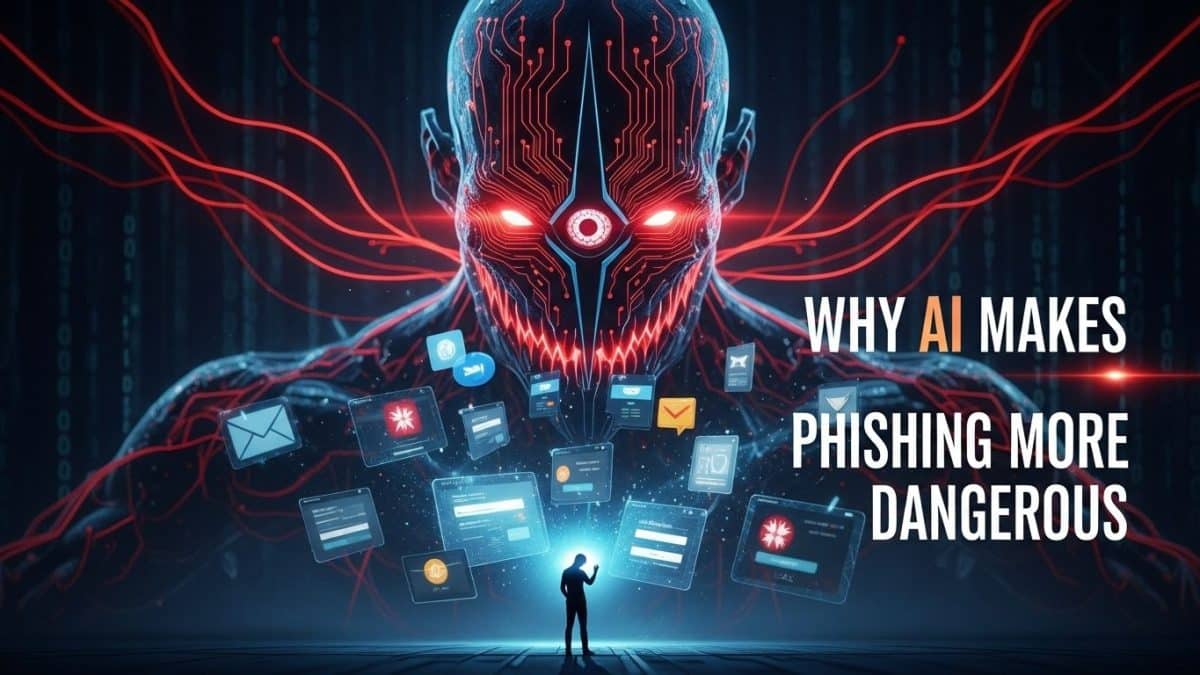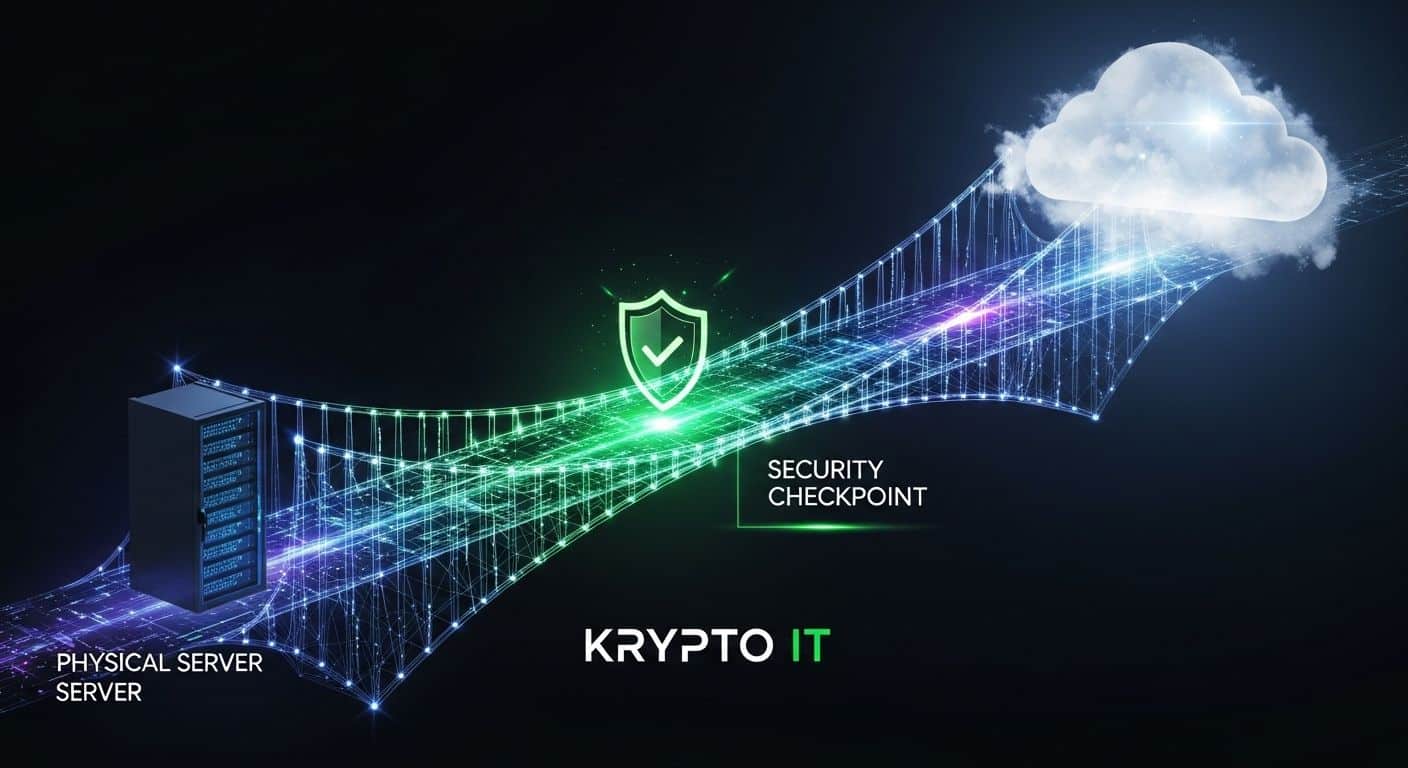
Your MSP is Your Best Partner in Compliance: A Simple Guide
October 4, 2025
Ransomware-as-a-Service: The Uber of Cybercrime and How It Targets Your SMB
October 6, 2025The threat landscape for small to medium-sized businesses (SMBs) is constantly evolving, but perhaps no change is as significant—or as immediate—as the rise of Artificial Intelligence (AI) in the hands of cybercriminals. The days of easily spotted, poorly worded phishing emails are rapidly coming to an end. AI is ushering in a new era of social engineering, making attacks more personalized, more believable, and vastly more dangerous.
At Krypto IT, we believe that understanding this new threat is the first step to defending against it.
Why AI Makes Phishing More Dangerous
Phishing, the act of attempting to acquire sensitive information (like usernames, passwords, and credit card details) by disguising as a trustworthy entity, used to be a high-volume, low-success game. Cybercriminals would send out thousands of generic emails hoping a few victims would fall for the obvious grammatical errors or awkward language.
AI changes the calculus entirely:
1. Perfect Language and Grammar
Sophisticated large language models (LLMs) eliminate the tell-tale signs of a malicious email. No more strange phrasing or obvious typos. Phishing attempts now use perfect English, or even perfectly localized language, instantly boosting credibility. For an SMB dealing with global or diverse customers, this is a major hurdle for employee detection.
2. Hyper-Personalization (Spear Phishing)
Criminals can use publicly available data (from LinkedIn, corporate websites, or social media) and feed it into AI to generate highly personalized, convincing messages. This is the new era of spear phishing. The email may reference a recent company event, a specific project, or even use a colleague’s actual speaking style and tone, making it nearly impossible for an employee to flag as suspicious.
3. Faster and Broader Campaigns
What used to take a team of human hackers days or weeks to research and write—creating custom domain names, drafting personalized emails, and setting up communication paths—AI can do in minutes. This speed and scale mean SMBs are being targeted more frequently and with greater sophistication than ever before.
The New Social Engineering Toolkit: Deepfakes and Voice Clones
The threat extends far beyond text-based emails. AI tools are rapidly making voice and video mimicry accessible to even novice cybercriminals.
- Voice Cloning: A criminal can use a short clip of your CEO’s voice (perhaps from a conference call recording or an old marketing video) to clone their voice and call your accounting department with an urgent, seemingly authentic request for a funds transfer.
- Deepfake Video: While more complex, deepfake videos are becoming cheaper and easier to produce, potentially leading to video calls that appear to be from a senior executive demanding immediate action.
For an SMB where communication is often informal and rapid, these high-pressure, hyper-realistic attacks are incredibly difficult to resist.
How SMBs Can Turn the Tide
The good news is that defenses are evolving just as quickly as the threats. Protecting your business requires a layered approach, blending technology and education.
1. Advanced Email Filtering and AI Detection
Standard spam filters are no match for AI-generated phishing. Your business needs advanced email security solutions that use their own AI models to analyze anomalies, tone, and context that traditional filters miss. This is often part of a Managed IT Service Provider’s comprehensive stack.
2. Continuous Security Awareness Training
If the emails look perfect, your employees need to focus on context and process, not just grammar. Training should focus on:
* Verification: Never act on urgent requests for money or data without secondary verification (e.g., a call-back on a known, trusted number).
* MFA (Multi-Factor Authentication): Even if credentials are stolen via phishing, MFA prevents the attacker from logging in.
* Drill Exercises: Regularly run sophisticated phishing simulations that mimic AI-generated attacks.
3. Adopt a Zero Trust Philosophy
In a world where internal communications can be cloned, your network must operate on the principle of Zero Trust—never automatically trust any user or device, inside or outside the network. Every request for access or information must be verified.
Don’t Fight AI Cybercrime Alone
The speed and complexity of AI-powered phishing attacks have made DIY cybersecurity impossible for most SMBs. Your focus needs to be on running your business, not on tracking the latest generative AI hacking tools.
Krypto IT is dedicated to protecting Houston’s businesses from the next generation of cyber threats. We implement layered security solutions and provide continuous training that fortifies your business against even the most sophisticated, AI-driven social engineering campaigns.
Stop guessing about your security. Talk to the experts at Krypto IT today about fortifying your team and your technology against the AI cyber threat.
Contact Krypto IT today for a complimentary security consultation.




